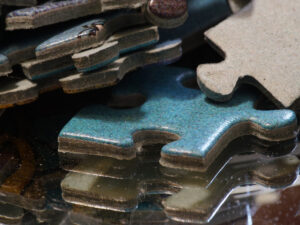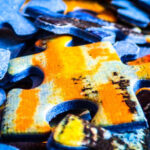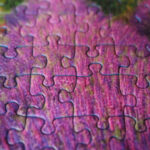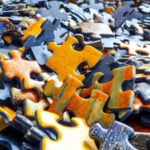Ever wondered how to host a puzzle competition?

Jigsaw puzzles have captivated puzzle enthusiasts for centuries, offering a delightful blend of challenge and relaxation, but for many the thrill is in a competition form.
In recent years, the art of puzzle-solving has transcended beyond a solitary pastime, evolving into a vibrant community experience through the rise of puzzle competitions. These events bring together puzzle aficionados from all walks of life, fostering a spirit of camaraderie and friendly rivalry. You don’t need to be the fastest puzzle player to enjoy the game. In fact, most of the speed puzzling community is full of fun loving jigsaw puzzle players who want to share their best puzzle assembling with others.
Table of Contents
The Thrill of Puzzle Competitions
Puzzle competitions have a thrill component that is perfect for anyone thirsting to play. Fast jigsaw puzzle play have gained immense popularity worldwide, attracting participants who relish the thrill of assembling intricate designs against the clock. Or timer. Or a few friends who want to have an impromptu showdown.
These puzzle competition events offer a unique opportunity to showcase one’s puzzle-solving prowess, hone problem-solving skills, and engage in a captivating social experience. Yeah, there is definitely some bragging rights when it comes to playing jigsaw puzzles fast.
Beyond the excitement of friendly competition, puzzle events foster a sense of community and belonging. Participants can connect with like-minded individuals, exchange strategies, and forge lasting friendships built upon a shared passion for puzzles. Which is why so many people ask if it’s possible to host a puzzle competition.
What is a Jigsaw Puzzle Competition?

A jigsaw puzzle competition usually involves both individuals and teams vying against each other to solve a jigsaw puzzle the fastest. The main objective is to be the first to complete the puzzle. These events often consist of multiple rounds, which are conducted to determine the ultimate winner based speed.
What Type of Puzzles Are Used in Puzzle Competitions?

Each player or team receives the same puzzle for every round. Typically, puzzles with a standard jigsaw puzzle cut is used.
How Does a Jigsaw Puzzle Competition Start?

A jigsaw puzzle, either plastic wrapped or in a fabric bag is given to the player. The puzzle must be laying on a flat surface, not touched, until the competition begins.
How Does a Jigsaw Puzzle Competition End?

The player or individual who finishes the jigsaw puzzle first, slaps the timer and throws their hands in the air indicating they have completed the puzzle. If there is a tie, the player with the puzzle offering the most completed puzzle in an specified time has won.
What are the Prizes for Jigsaw Puzzle Competitions?

Bragging rights and a trophy typically are the biggest prizes when winning a jigsaw puzzle competition. Sometimes there are gift cards and cash prizes, but typically very small amounts.
Do People Know the Jigsaw Puzzle that Will be Played at a Jigsaw Puzzle Competition?

No one gets to see the jigsaw puzzle until the timer begins. This creates a fair, fun playing atmosphere and a thrilling start to the competition.
Can You Play a Jigsaw Puzzle Competition Online?

Yes, there are many jigsaw players who play speed puzzling events and race for their best time during a jigsaw puzzle competition online.
Ready to Host a Puzzle Competition: A Step-by-Step Guide
Organizing a successful puzzle competition requires meticulous planning and attention to detail. From selecting the perfect venue to securing prizes and promoting the event, every aspect plays a crucial role in creating an unforgettable experience.
Planning Makes it Possible
Before you decide to actually host a puzzle competition, you need to see how hard it might be in your community. Having a well structured plan will give your participants something to be excited about! And your puzzle competition will be a success.
Venue Selection
Choosing the right venue is paramount for a seamless puzzle competition experience. Consider factors such as accessibility, lighting conditions, and adequate space for participants to comfortably assemble their puzzles.
Community centers, libraries, or even local businesses with ample floor space can make ideal venues. Most importantly, make sure it will be family friendly and enough room for guests of the players.
Puzzle Selection
The heart of any puzzle competition lies in the puzzles themselves. Carefully curate a diverse selection of puzzles to cater to various skill levels and preferences. Consider offering a range of puzzle types, including traditional jigsaw puzzles, 3D puzzles, and even themed puzzles for added excitement.
You will also need to establish the skill level of your target participant. If you are working with adults, it will be a different skill level than kids, teens or even young adults. This will need to reflect on the designs and the number of pieces for the jigsaw puzzle.
How Many Puzzles Do You Need for a Jigsaw Puzzle Competition?
Planning a jigsaw puzzle competition involves some essential calculations to ensure a fair and exciting event. Here’s a straightforward guide to help you determine the number of puzzles you’ll need.
Step-by-Step Consideration:
- Count the Participants: Define the total number of individuals or teams participating in your competition.
- Rounds and Fairness: Every participant in each round should work on the same puzzle to ensure fair competition. This means if you have multiple rounds, you’ll need multiple sets of identical puzzles.
- Calculate Per Round: Multiply the number of participants by the number of rounds. For example, if you have ten teams and three rounds:
- 10 teams * 3 rounds = 30 puzzles
- Spare Puzzles: It’s smart to have a few spare puzzles on hand in case of any last-minute additions or mishaps.
Example Calculation
Let’s say you have 12 teams and plan for 4 rounds:
- Total Puzzles Needed: 12 teams * 4 rounds = 48 puzzles
- Plus Spares: Always add about 5-10% extra. For 48 puzzles, add approximately 2-5 extra puzzles. Thus, you should have around 50-53 puzzles ready.
What Is Your Registration Fee?
Depending on whether you are hosting a puzzle competition for profit or for fun, you need to determine how much your registration fee might be. Sponsorships (see below) can offset some costs, but if this is for a fundraising opportunity or other money making ventures, you need to figure out the fees. Not only do you have the room, the gifts, and the workers (unless you decide on recruiting volunteers), you will have the cost of the puzzles you decide to use during the puzzle competition.
Establishing Rules and Regulations
Clear and concise rules are essential for ensuring a fair and enjoyable competition. Outline guidelines for time limits, puzzle handling, and scoring systems. Determine whether participants will work individually or in teams, and establish procedures for resolving any disputes or tie-breakers. Also make sure you determine rules around unfair play and what is expected during the puzzle competition
Promoting the Event
Effective promotion is key to attracting a diverse pool of participants and generating buzz around your puzzle competition. Leverage social media platforms, local community groups, and puzzle-enthusiast forums to spread the word. Consider partnering with local businesses or organizations to cross-promote the event and reach a wider audience.
It’s especially important to loop in puzzle groups, puzzle stores and anyone who might enjoy playing puzzles. This might include sharing details with senior groups, service groups and civic groups to create more interest.
Securing Sponsorships and Prizes
Offering attractive prizes can heighten the excitement and motivation for participants. Seek sponsorships from local businesses, puzzle manufacturers, or community organizations to secure prizes that align with the interests of puzzle enthusiasts. Gift cards, merchandise, or even custom-made puzzles can serve as coveted rewards.
While sponsorships and prizes help facilitate the needs of the puzzle competition, don’t completely rely on businesses alone. Many groups have small grants to offer events, like a puzzle competition, to help offset costs and purchases to make your event special.
Volunteer Recruitment and Training
A dedicated team of volunteers is crucial for ensuring a smooth and well-organized event. Recruit individuals passionate about puzzles or community engagement to assist with setup, registration, timekeeping, and overall event management. Provide comprehensive training to volunteers to ensure they are equipped to handle any challenges that may arise.
While it’s good to have volunteers to help, you need to set a standard of responsibility. Everyone should sign a code of conduct to make sure your event is fair, especially when it comes to timekeeping and management considerations.
Creating a Memorable Experience
While the competitive aspect is undoubtedly thrilling, a successful puzzle competition should also prioritize creating a memorable and enjoyable experience for all participants. Consider incorporating interactive elements, such as puzzle-themed games or trivia sessions, to foster a lively and engaging atmosphere. Offer prizes for other events as well as the competitive puzzle play.
Encourage participants to socialize with food and beverages available to purchase for low cost. People will strike up conversations around tables and chairs in a naturally friendly environment. Expect folks to share their puzzle-solving strategies, fostering a sense of community and cheer on others. Providing refreshments and comfortable seating areas that are slightly secluded before competitions to ensure participants can take breaks, find their focus and recharge during the event is also important.
Embracing Inclusivity and Accessibility
Puzzle competitions should strive to be inclusive and accessible to individuals of all ages and abilities. Consider offering dedicated categories or accommodations for participants with special needs, special ages and even an event for all that is free. It will ensure that everyone has an opportunity to participate and enjoy the event.
Additionally, promote diversity and representation by featuring puzzles that celebrate different cultures, traditions, and perspectives. This not only enhances the overall experience but also fosters a sense of inclusivity and respect within your community. It may cost more, especially since multi-cultural jigsaw puzzles are produced by smaller puzzle companies, but it’s an important enrichment that should be sought.
Fostering Community Engagement
Puzzle competitions can serve as powerful platforms for community engagement and fundraising initiatives. Consider partnering with local non-profit organizations or charities to donate a portion of the proceeds or registration fees towards a worthy cause. With a partner that’s a charity when you host a puzzle competition, it opens more opportunities. Silent auctions, merchandise and other options can be considered.
Encourage participants to invite friends and family members to attend and support the event, further strengthening the sense of community and raising awareness about the cause or organization you are supporting.
Offer Puzzle Workshops and Speed Puzzling Demonstrations
While the idea is to host a puzzle competition, to get more people involved, consider sharing some educational aspects of the puzzle world. From puzzle workshops to speed puzzling demonstrations, people will be interested in how this trendy puzzle action happens and many will stop by to watch (and show the kids.
Online Puzzle Competitions: Embracing the Virtual Realm
In the digital age, to host a puzzle competition have transcended physical boundaries, allowing enthusiasts from around the world to participate in virtual events. Online puzzle competitions offer a convenient and accessible alternative, enabling participants to engage in friendly rivalry from the comfort of their homes.
Leverage video conferencing platforms and dedicated puzzle-solving websites to host a puzzle competition online. Establish clear guidelines for remote participation, such as webcam requirements and screen-sharing protocols, to ensure a fair and transparent experience for all participants.
Celebrating Achievements and Building Lasting Connections
At the conclusion of the puzzle competition, take the time to celebrate the achievements of all participants. Recognize the winners with awards or prizes, but also acknowledge the efforts and perseverance of every participant who contributed to the event’s success.
Encourage participants to exchange contact information and connect through social media platforms or dedicated puzzle communities. This fosters lasting connections and enables participants to continue sharing their passion for puzzles long after the event has concluded.
Embracing the Future of Puzzle Competitions
As the popularity of puzzle competitions continues to grow, it is essential to embrace innovation and adapt to emerging trends and technologies. Stay informed about advancements in puzzle design, such as augmented reality puzzles or interactive digital puzzles, and consider incorporating these elements into future events. Learn from your mistakes and keep those elements your audience loved.
Continuously seek feedback from participants and remain open to new ideas and suggestions. This will ensure that when you host a puzzle competition it remain relevant, engaging, and at the forefront of this ever-evolving puzzle community.
Conclusion
Hosting a jigsaw puzzle competition is an exhilarating endeavor. I’ve done it a few times and after I’ve recovered from all the effort that goes into the event, I couldn’t be more pleased to be part of the process.
When you host a puzzle competition, it brings together puzzle enthusiasts, fosters a sense of community, and celebrates the joy of problem-solving. By following these guidelines, you can create a memorable and inclusive event that not only challenges participants’ puzzle-solving skills but also strengthens the bonds within the puzzle community.
While your feet might be sore after hosting such a big puzzle event in your community, it will create lasting memories for puzzle enthusiasts of all ages and backgrounds.
